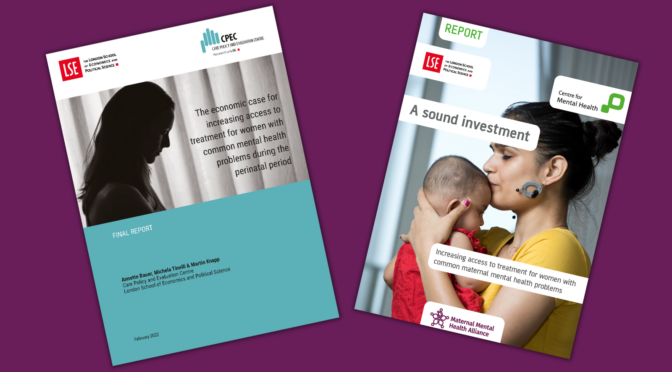Posted By: Amy Tubb
1st February 2022
5 minute read

In a new study commissioned by the MMHA, researchers from LSE evaluated the economic viability of reforming current treatment for pregnant and postnatal women experiencing common maternal mental health problems such as depression and anxiety.
The report, ‘The economic case for increasing access to treatment for women with common mental health problems during the perinatal period’, estimates the costs and benefits of a model of care which could give women’s mental health the same priority as their physical health. The model, which focuses on the essential role of midwives and health visitors, would allow for women’s mental wellbeing to be accurately assessed at every routine contact and suitable treatments to be offered – in a similar way to physical conditions such as diabetes or high blood pressure.
The proposed ‘integrated model of care’ would include dedicated maternal mental health training for health visitors and midwives as well as greater collaboration with other health care services.
In the report, resources needed to set up and provide this model of care – namely employment and training costs – are measured against their economic return. Researchers conclude that it could lead to cost savings for the NHS over 10 years of £52 million and improvements in women’s quality of life estimated at £437 million. In total, this is a net benefit of £490 million over 10 years.
In contrast, the report finds that current practice leaves many women without access to evidence-based treatment when and where they need it.
Policy analysis by MMHA member, Centre for Mental Health, determines that integrated service provision is the logical and economical next step in the evolution of perinatal mental health care in the UK. It would close a major gap and ensure women get timely access to help for their mental health needs.
For the suggested model to be effective, it must address existing inequalities in women’s experiences of maternity and mental health care. Women of colour, for example, have poorer outcomes from maternity services, including higher mortality rates. It will therefore be vital that integrated service provision is developed in an equitable way, actively seeking to meet the needs of all women, including those who are currently less well-served.
“This report shines a very welcome light on the vital role of midwives and health visitors in identifying women with mental health problems during and after pregnancy and facilitating women’s access to treatment. It is fantastic to see a fully researched, costed model of care that would improve the lives of these women and their loved ones and also carry significant savings. With such clear evidence of human benefit and a sound investment, it is vital that we make it easier for pregnant women and new mums to access mental health support during routine contacts with their midwives and health visitors.”
“There has been fantastic investment into specialist perinatal mental health services across the UK in recent years. This has been transformative for women, babies and families affected by the most severe and complex mental health problems, but there are still major gaps for those who don’t need such highly specialised care. This research provides important evidence of a practical, cost-effective solution for addressing one of those gaps in maternal mental health services and improving the lives of so many in this generation and the next.”
“Building on our 2014 study, which highlighted the human suffering and costs linked to perinatal mental health problems, our new study shows that there are affordable ways for increasing access to treatment for women with common mental health problems that are leading to substantial quality of life improvements.”
“Maternal mental health difficulties are common and can be serious. Every contact with a midwife or health visitor is an opportunity to offer support quickly when it’s needed. But shortages of both have made that difficult, and too many women miss out on effective early help for common mental health problems. Supporting midwives and health visitors with the training and time to meet women’s mental health needs is a sound investment that could make a difference to many thousands of women and their families.”
– Ends –
Contact
media@maternalmentalhealthalliance.org